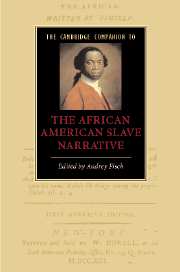Book contents
- Frontmatter
- Introduction
- Part I: The Slave Narrative and Transnational Abolitionism
- 1 The rise, development, and circulation of the slave narrative
- 2 Politics and political philosophy in the slave narrative
- 3 Olaudah Equiano: African British abolitionist and founder of the African American slave narrative
- 4 The slave narrative and the literature of abolition
- Part II: The Slave Narrative and Anglo-American Literary Traditions
- Part III: The Slave Narrative and the African American Literary Tradition
- Part IV: The Slave Narrative and the Politics of Knowledge
- Further Reading
- Index
4 - The slave narrative and the literature of abolition
from Part I: - The Slave Narrative and Transnational Abolitionism
Published online by Cambridge University Press: 28 July 2007
- Frontmatter
- Introduction
- Part I: The Slave Narrative and Transnational Abolitionism
- 1 The rise, development, and circulation of the slave narrative
- 2 Politics and political philosophy in the slave narrative
- 3 Olaudah Equiano: African British abolitionist and founder of the African American slave narrative
- 4 The slave narrative and the literature of abolition
- Part II: The Slave Narrative and Anglo-American Literary Traditions
- Part III: The Slave Narrative and the African American Literary Tradition
- Part IV: The Slave Narrative and the Politics of Knowledge
- Further Reading
- Index
Summary
Slave narratives were dynamic, responsive, hybrid writings that evolved within a range of diverse dialogues, debates, and arguments. The interest which they continue to inspire is due, in a large part, to the challenges we face as modern-day readers attempting to bring ourselves closer to the historical moments and discursive practices within which these urgent stories were forged. The responsive nature of the slave narrative means that in order to understand its features and tropes we must explore the literature to which it reacted and by which it was often constituted.
While proslavery debates presented the most racist and virulent arguments to which the narratives had to reply, abolitionist discourse and literature offered representations of slaves and black people, combined with antislavery opinions and views, which became interwoven in the fabric of the slave narratives. This interconnectedness was not always, however, due to an agreement on antislavery strategy or even to a coincidence of perspective: for example, often abolitionist writing could be as racist as proslavery writing, offering negative images of black people as ignorant and morally undeveloped. In Uncle Tom's Cabin Harriet Beecher Stowe opposes Eva “the fair high-bred child” and Topsy “ the Afric, born of ages of oppression, submission, ignorance, toil and vice,” suggesting a racial difference between white and black not to be overcome by the abolition of slavery itself. In his second narrative, My Bondage and My Freedom, Frederick Douglass describes his frustration at being used by the abolitionists to repeat his story “month after month”: “'Give us the facts,' said Collins, 'we will take care of the philosophy.'”
- Type
- Chapter
- Information
- Publisher: Cambridge University PressPrint publication year: 2007
- 7
- Cited by

